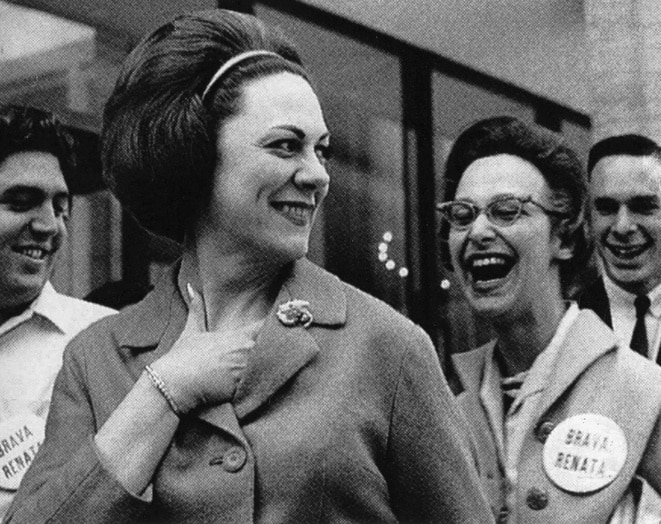Autograph millionaire left nothing to the Met
OperaWe reported a couple of days back that Lois Kirschenbaum, New York’s biggest opera fan, had left a $200k bequest to further the careers of young singers.
It now appears from a Javier Hernandez report in the NY Times that frugal Lois, who worked as a switchboard operator, left savings of $4 million, much of which will go to arts organisations.
But not a penny to the Met, which banned her from the backstage in the 1990s.
Read on here.
Pictured: Tebaldi with Lois






1) If she was banned in the 1990s, and consequently gave nothing to the Met, that was Joseph Volpe’s parting gift to Peter Gelb.
2) If she amassed $4M as a switchboard operator, that was because she managed to snag a rent-controlled apartment in Manhattan.
For those not familiar with rent-controlled apartments in NYC, it’s basically winning the lottery for life.
3) But she gave it all back to the arts, so it’s a virtuous circle.
4) The Met could’ve, conceivably, gotten all $4M. Don’t ban your diehard fans.
I think there are more profile articles in the NYT about Ms. Kirschenbaum than anybody at or who sang at the Met (except, I’d guess, for James Levine or Leontyne Price).
Let’s not turn her into Saint Lois, Patron Saint of Young Singers. The Met was right to ban her. She made a nuisance of herself. Even her fellow autograph hounds considered her overly aggressive in her efforts to meet the artists after a performance. It’s hard to imagine she had that kind of money. She walked around the city like a bag lady, wearing the same coat for years. What I find most interesting is that she rubbed elbows with many other individuals who were as zealous as she was. One of them in particular is a very influential agent today. Lois annoyed every great singer who ever passed through the artist entrances of the Old and New Met for decades. She was more tolerated than admired.
MET-Schandenfreude schöner Götterfunken,
Tochter aus Elysium…
The Met is getting exactly what they deserve from her.
This article should be a reminder for everyone that one should make sure to review and update their wills occasionally. The fact that Lois donated $200,000 to New York City Opera is crazy. It’s a virtually defuct organization at this point, and it’s annual budget now basically goes to pay Michael Capasso’s salary. Nuts.
I attended the NYCO performance of “Maria de Buenos Aires” down at Le Poisson Rouge. (Great piece, not a great performance, but I digress). When I heard they were doing this, all that were left were standing room tickets, and I wanted to hear the piece, so I stood for the whole performance. On the night that I was there, Mr. Capasso spent the intermission attempting to charm young women in the audience by offering them free drinks (“Just go to the bar and tell them Michael said to give you a free drink”) and then spent the entirety of the second half talking very loudly with various people, to the point where I couldn’t hear the music. He is not a good representative for what’s left of the company. (And yes, I did ask him to keep his voice down).
I had to read that “New York City Opera” reference twice in the NYTimes article. I didn’t even think that they existed at all anymore.
Justice is served!
Margo Channing: “Autograph fiends, they’re not people . . .”
I had never heard of Lois until this week’s NYT article about her donations from her estate. As I started reading about her, I thought to myself – “this is neurodiversity in action” – clearly, there was something different about Lois’ brain that made her focus so singularly on opera, to the exclusion of creating other meaningful connections in her life. Lois seems like one of those people for whom an activity, object, or idea is more satisfying to engage with than people, or even a person, singular. Opera gave her a framework for engaging with the world, and probably – at some level – making the world make sense to her. Monomania is a feature of some types of autism. I don’t want to armchair-diagnose someone, but the more stories I read about Lois – good, bad or indifferent – the clearer it becomes to me that this was a neurodiverse individual who figured out a way to make life work for her.
So while I understand that her behavior was aggressive, disruptive, and at times, unwelcome, I hope people will maybe think of it as “this was a neurodiverse person whose way of interfacing with the world was with, and through, opera and opera performers” rather than “this was an annoying, weird old lady who behaved badly.” Had she been born in more recent times, her neurodiversity would (hopefully) have been recognized early on, and she could have gotten therapeutic services to help her navigate the world in a less-polarizing way. And therapies could have helped her forge better connections with humans, without needing opera as a filter/mediator. Autism Spectrum Disorder didn’t exist as a diagnosis when Lois was a child, and there certainly weren’t therapies for it. There are many people like Lois in the world, and we would all be better off if we viewed them with empathy. She doesn’t need to be sainted, but it would be great if she could be understood.
Michelle, I knew her and agree. She was definitely on the spectrum and while some artists loved her, others gave her wide berth. Volpe made a decision that was not unfair under the circumstances. She was no longer given special dispensation.